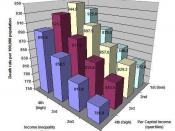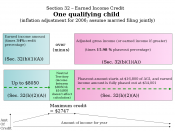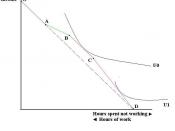The United States has the greatest economic inequality of any developed nation. The gap between the rich and poor in America is the largest it has ever been in our nation's history. For example, the top one percent of Americans control 39% of the wealth in the United States (Chart: Ownership of Household Wealth in the United States). American government policies should address poverty by promoting equality of conditions. Policy that equalizes economic conditions is more effective in reducing inequality than policy that equalizes opportunity.
While providing equality of opportunity often requires policy promoting equality of conditions, and vice versa, both concepts have distinct differences. Equality of opportunity is "the idea that there should be no discriminatory barriers placed on an individual's access to economic success" (Miroff, Seidelman, Swanstorm A-28). According to the philosophy behind equal opportunity, the government must not place barriers to social mobility and people have the right to succeed or fail based solely on their skills, education, and perseverance.
On the other hand, policy that advances equality of conditions "levels incomes and wealth so that nobody is either very rich or very poor" (Miroff, Seidelman, Swanstorm 87), usually through redistribution programs. Both forms of policy attempt to attack poverty and the conditions that cause it and, therefore, there often is a direct correlation between reducing inequalities and providing equal opportunity. Both policies have different approaches to addressing poverty. Policy that advocates equality of opportunity attempts to level the socioeconomic "playing field," removing all obstacles, whereas policy that advances equality of conditions makes the field smaller, like making the gap between the rich and poor less wide.
Equalizing conditions through tax policy is more effective in reducing inequality than policy that equalizes opportunity. For example, the Earned Income Tax Credit "provides supplemental pay to low-wage workers in...



Economic Inequality...
I totally agree with this essay, you raised many good points. I studied this last year and it is sad to know that such a great country can have such a large gap between the rich and the poor.. i guess it's the same in all countries though... nothing ever stays gold - good work though :)
3 out of 4 people found this comment useful.